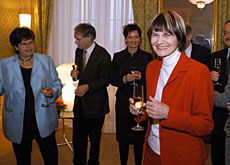
Magic Formula survives – for now

The election of Micheline Calmy-Rey to the cabinet has once again demonstrated the resilience of Switzerland's power-sharing formula.
But the rightwing’s decision to abstain from the final vote in parliament suggests the coalition that has been in place since 1959 may be on its last legs.
Three of the four parties in government voted for the “Magic Formula” by electing a Social Democrat to fill one of the party’s two posts in the cabinet.
The fourth – the rightwing Swiss People’s Party – put forward a stalking horse, Toni Bortoluzzi, and backed him through four rounds of voting until he was forced out of the race.
Most of their parliamentarians then sat on their hands rather than choose from one of the two Social Democratic candidates.
“The People’s Party has given notice to the system we have had in place since 1959,” said political analyst, Johann Aeschlimann, after the fifth round of voting confirmed Calmy-Rey as Switzerland’s newest cabinet minister.
“[They] are telling people ‘if you want change, vote for us’,” Aeschlimann told swissinfo. “And by change they mean a change in government.”
The party, which has one seat in the cabinet compared with the others’ two, has been demanding a second seat since it won the biggest share of the popular vote in the 1999 general election.
Undemocratic
It argues that the Magic Formula – designed to share out cabinet posts in a way that mirrored the linguistic and political landscape of Switzerland – has become undemocratic because it doesn’t represent the People’s Party electoral strength.
Luzi Stamm, a People’s Party parliamentarian, told swissinfo he didn’t care which of the Social Democrat candidates – Calmy-Rey or Ruth Lüthi – was elected to the cabinet.
“To us there was no difference between them,” he said. “The problem remains the same: the part of our population which does not want to join the European Union [for example] is not represented in government, and we are trying to put someone from our side in government.”
The party’s hardliners – centred around Zurich – are also unhappy with their cabinet representative, Samuel Schmid, who belongs to the more moderate Bern wing of the party.
“The irony is that they do have one seat in the cabinet, with Samuel Schmid,” Aeschlimann said. “But they are not happy with him because he follows the government line rather than the party line on the big issues like membership of the United Nations, or asylum seekers.”
Closed ranks
Despite the People’s Party’s campaign for a second cabinet seat, the other three parties in government – two of which are centre-right – have closed ranks to preserve the system.
“This election was a confirmation of the Swiss political system,” said Aeschlimann. “It worked without fault.”
Analysts agree that the Swiss People’s Party is playing a long game, and certainly didn’t expect to win this particular vote.
Little by little, though, the party is increasing the pressure on the Magic Formula ahead of next October’s general election.
If, as polls suggest, the People’s Party does well in that election, its demands for a second cabinet seat – almost certainly at the expense of the Christian Democrats – will become more compelling.
The party should bear in mind that it took almost 20 years before the Social Democrats saw their share of the popular vote translated into cabinet seats.
swissinfo
Parties’ share of the vote in the 1999 general election:
Social Democrats: 22.48%
Swiss People’s Party: 22.5%
Radical Party: 19.93%
Christian Democrats: 15.78%
The Magic Formula gives two seats each to the Social Democrats (centre left), the Radicals (centre right) and the Christian Democrats (centre right), while the Swiss People’s Party has one.
The division of seats (four for German speakers, three for Latins) still corresponds to the linguistic composition of the country.
But the rise of the rightwing Swiss People’s Party, and the decline of the Christian Democrats, means the magic formula is now out of sync with the parties’ electoral support.

In compliance with the JTI standards
More: SWI swissinfo.ch certified by the Journalism Trust Initiative





























You can find an overview of ongoing debates with our journalists here . Please join us!
If you want to start a conversation about a topic raised in this article or want to report factual errors, email us at english@swissinfo.ch.